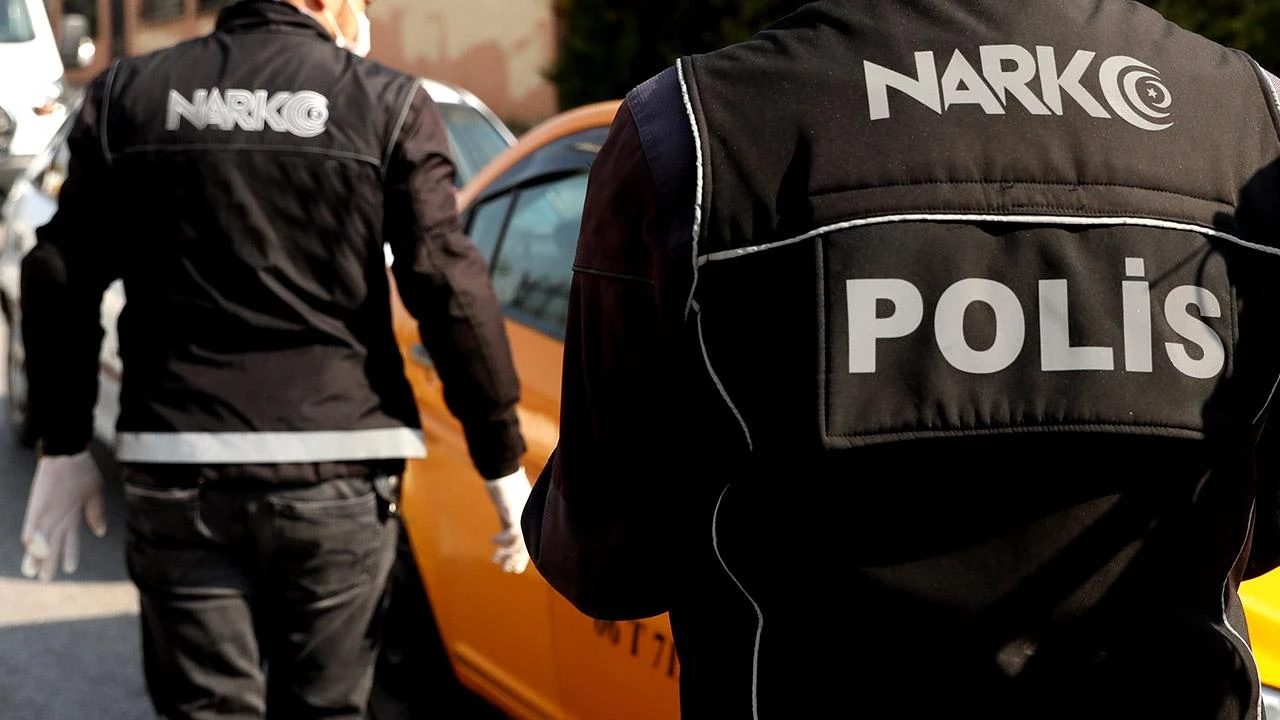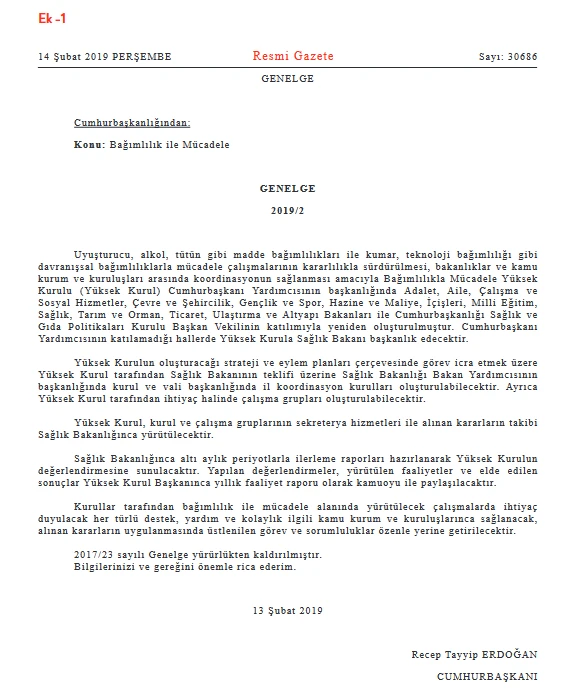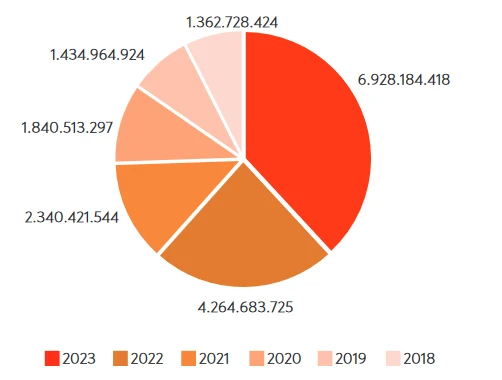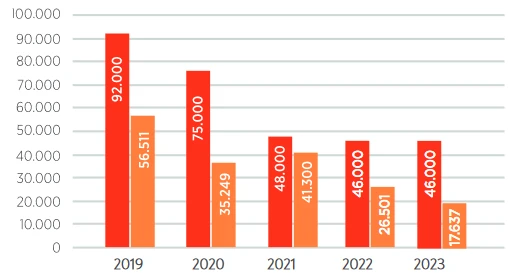Progress and challenges: Here’s all about Türkiye’s national drug policy, strategy
 Narcotics police officers from the Anti-Narcotic Crimes Directorate with reflective vests, Türkiye, September 2024. (AA Photo)
Narcotics police officers from the Anti-Narcotic Crimes Directorate with reflective vests, Türkiye, September 2024. (AA Photo)
Türkiye has undertaken significant steps in its fight against drug addiction and illicit drug use, building on a robust legal framework and establishing comprehensive initiatives through the 2024–2028 National Drug Strategy Document and Action Plan.
These measures aim to create a coordinated approach across multiple institutions to combat the country’s ongoing drug challenges.
Structural changes, role of high council in combatting addiction
With the Türkiye’s transition to the Presidential Government System in 2018, the structures within key institutions, including those tasked with combatting addiction, underwent substantial changes.
In 2019, Presidential Decree 2019/2 established the High Council on Combatting Addiction (BMYK), chaired by the Vice President.
The council includes ministers from various key departments, such as Health, Justice, Education, and Interior, alongside other senior officials.
In the absence of the Vice President, the Minister of Health presides over the council, which is tasked with ensuring that anti-addiction efforts continue without interruption.
This strategic alignment resulted in the establishment of technical and regional coordination committees to oversee the execution of policies at both national and local levels.

2023 achievements, plans for 2024–2028
By 2023, the Technical Committee on Combatting Addiction met three times to discuss progress and future strategies. The monitoring platform for the National Strategy Document on Drug Control was established to provide real-time data sharing among all relevant institutions.
The success of these initiatives is reflected in the 2023 data input from both central and regional offices, which marked a key milestone for coordinated drug control.
The preparation of the 2024–2028 National Drug Strategy Document and Action Plan, led by the Ministry of Health, is already underway.
This document will serve as the roadmap for the next five years, emphasizing coordinated national efforts to enhance the country’s combatting capacity.
The strategy aims to integrate measurable indicators and objectives to ensure success, focusing strongly on increasing drug treatment and prevention efforts.
Public expenditure, financial management
The fight against drug use in Türkiye is funded through various government budgets. As reported by the Turkish Monitoring Center for Drugs and Drug Addiction (TUBIM), public expenditure in this area saw a 62.5% increase in 2023 compared to the previous year, totaling TRY 6.93 billion ($202.9 million).
These funds are directed toward enhancing law enforcement, medical treatment, and rehabilitation services.

Legal framework, international commitments
Türkiye’s legal framework for combatting drugs aligns closely with international conventions, including the 1961 Single Convention on Narcotic Drugs and the 1971 Convention on Psychotropic Substances.
The Turkish Penal Code outlines strict penalties for the production, trade, and facilitation of drug use, with punishments ranging from 2 to 30 years in prison, depending on the severity of the offense.
Besides national laws, Türkiye also supports international efforts under the umbrella of organizations like the United Nations and European Union, contributing to projects that reinforce global drug control measures.
Türkiye’s involvement with the European Monitoring Centre for Drugs and Drug Addiction (EMCDDA) since 2014 highlights its commitment to international collaboration.
Cultivation control, legal amendments
Türkiye is one of the few countries authorized to produce poppy for medical use under international supervision. Controlled cultivation is regulated by the General Directorate of Turkish Grain Board (TMO) through an online system known as HUBAS, introduced in 2019.
The system has significantly reduced paperwork and improved the monitoring of cultivation permits. In cooperation with TURKSAT, satellite imagery is now being used to monitor poppy fields, further enhancing Türkiye’s ability to prevent illegal cultivation.
The government has also made significant changes to the 2313 Law on the Control of Narcotic Substances.
With amendments passed in 2023, hemp cultivation for medicinal purposes has been regulated, marking a critical development in the legal production of plant-based narcotic substances.

Recent developments, international discussions
In recent years, the debate around cannabis use has intensified globally. Türkiye has remained firm in its opposition to the liberalization of cannabis use, voting against five of the six recommendations by the United Nations Commission on Narcotic Drugs (UNCND) that would have relaxed global cannabis restrictions.
Despite these global trends, Türkiye continues to maintain stringent controls on the cultivation and use of cannabis, allowing cultivation for medicinal research under government supervision.
However, Türkiye remains committed to adhering to international standards while also monitoring global scientific advancements in using cannabis for medical purposes.
The country’s strict regulations reflect concerns about the misuse of cannabis and its potential to exacerbate the global drug problem.
| Year | Area (Da) | Fiber (Tonne) | Seeds (Tonne) |
| 2019 | 696 | 19 | 20 |
| 2020 | 4.353 | 19 | 273 |
| 2021 | 641 | 21 | 20 |
| 2022 | 2.328 | 31 | 159 |
| 2023 | 6.040 | 359 | 327 |
Legislative reforms, criminal penalties
Recent legislative amendments, including Law No. 7445, introduced several stricter measures to address emerging synthetic drugs, like synthetic cannabinoids, which have been increasingly found in Türkiye.
The law expands the scope of penalties for drug offenses and introduces more stringent consequences for those involved in the production and distribution of new synthetic drugs.
Additionally, new measures allow for more frequent, surprise drug testing for individuals undergoing rehabilitation as part of their suspended sentence.
Under these amendments, courts are now required to expedite decisions regarding the compulsory treatment of drug addicts, ensuring a more responsive judicial system.
Outlook, challenges
Türkiye continues to enhance its efforts in combatting drug addiction through a comprehensive and multi-faceted approach.
With the implementation of the 2024–2028 National Drug Strategy Document and Action Plan, Türkiye aims to address the evolving challenges posed by drug use and trafficking, both domestically and internationally.



